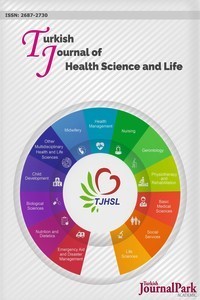Evaluation of empathic tendency levels of the intensive care unit nurses in terms of various variables
Yoğun bakım hemşireliği, Empatik Eğilim, Empatik Eğilim Ölçeği.
Evaluation of empathic tendency levels of the intensive care unit nurses in terms of various variables
___
- Dökmen Ü. İletişim çatışmaları ve empati, 43. baskı. İstanbul, Remzi Kitabevi, 2010.
- Dizer B, İyigün E. Yoğun bakım hemşirelerinde empatik eğilim düzeyleri ve etkileyen faktörler. Atatürk Üniversitesi Hemşirelik Yüksekokulu Dergisi 2009;12(1):9-19.
- Fields S, Hojat K, Gonnella M, Mangione JS, Kane SG, Magee M. Comparisons of nurses and physicians on an operational measure of empathy. Evaluation & The Health Professions 2004;27(1):80-94.
- Mete S, Çerçek E. PDÖ yönetimiyle eğitim gören hemşirelik öğrencilerinin empatik eğilim ve becerilerinin incelenmesi. Cumhuriyet Üniversitesi Hemşirelik Yüksekokulu Dergisi 2005;9(2):11- 17.
- Ançel G. Developing empathy in nurses: An inservice training program. Arch Psychiatr Nurs 2006;20:249-257.
- Reynolds W, Scott B. Do nurses and other professional helpers normally display much empathy? J Adv Nurs 2000; 31:226-234.
- Boumans N, Berkhout A, Landeweerd A. Effects of resident-oriented care on quality of care, well-being and satisfaction with care, Scandinavian Journal of Caring Sciences, 2005;19(3):240-250.
- Naomi E. Does patient satisfaction contribute to nursing care quality? J Nurs Adm 2006;36(3):126-130.
- Öz F. Son sınıf hemşirelik öğrencilerinin empatik eğilimleri, empatik becerileri ile akademik başarıları arasındaki ilişki. Cumhuriyet Üniversitesi Hemşirelik Yüksekokulu Dergisi 1998;2(2):32-38.
- Taşdemir G. Ege Üniversitesi Uygulama ve Araştırma Hastanesi’nde çalışan hemşirelerin empatik eğilim ve iş doyumu düzeyleri arasındaki ilişkinin incelenmesi, Sağlık Bilimleri Enstitüsü, 1999, İzmir.
- Bekmezci H, Yurttaş ÇB, Özkan H. Ebelik bölümü öğrencilerinin empatik eğilim düzeylerinin belirlenmesi. HSP 2015;2(1):46-54.
- Moghaddasian S, Dizaji SL, Mahmoudi M. Nurses empathy and family needs in the intensive care units. Journal of Caring Sciences 2013;2(3):197-201.
- Karaman Özlü Z, Eskici V, Gümüş K, Yayla A, Özlü İ, Aksoy D, Yeşilay Y. Acil birimlerde çalışan hemşirelerin iletişim becerileri ve empati düzeylerinin değerlendirilmesi. Uluslararası Hakemli Hemşirelik Araştırmaları Dergisi 2016;8:52-71.
- Tunç P, Gitmez A, Krespi Boothby MR. Yoğun bakım ve yataklı servis hemşirelerinde duygusal emek stratejilerinin empatik eğilim açısından incelenmesi. Anadolu Psikiyatri Dergisi 2014;15:45-54.
- Duarte J, Pinto-Gouveia J, Cruz B. Relationships between nurses’ empathy, self-compassion and dimensions of professional quality of life: A cross-sectional study. Int J Nurs Stud 2016;60:1–11.
- Özdemir S, Tözün M, Ünsal A, Danacı B, Sözmen MK. Bir üniversite hastanesinde hemşirelerde empati düzeyleri ve iş doyumu ile ilişkisi. Smyrna Tıp Dergisi 2015;2:31-38.
- Özcan H. Hemşirelerin empatik eğilim ve empatik becerileri: Gümüşhane örneği. Gümüşhane Üniversitesi Sağlık Bilimleri Dergisi 2012;1(2):60-68.
- Dökmen Ü. Empatinin bir modele dayandırılarak ölçülmesi ve psikodrama ile geliştirilmesi. Ankara Üniversitesi Eğitim Bilimleri Fakültesi Dergisi 1988;62(21):155-190.
- Uncu F, Açık Y, Deveci SE, Çelebi E, Oğuzöncül A.F, Ulaş B. Sağlık yüksekokulunda öğrenim gören hemşirelik öğrencilerinin empatik eğilim ve empatik beceri düzeylerinin belirlenmesi. Yıldırım Beyazıt Üniversitesi Sağlık Bilimleri Fakültesi Hemşirelik E-Dergisi 2015;3(3):1-8.
- Karaca A, Açıkgöz F, Akkuş D. Eğitim ile empatik beceri ve empatik eğilim geliştirilebilir mi?: Bir sağlık yüksekokulu örneği. Acıbadem Üniversitesi Sağlık Bilimleri Dergisi 2013;4(3):118-122.
- ISSN: 2687-2730
- Başlangıç: 2018
- Yayıncı: Mümin POLAT
Investigation of perspective of the nursing students against refugees in Turkey
Canan DEMİR BARUTCU, Fatma ZENGİN
The effects of body mass index (BMI) on the acceptance and future of profession
Serkan KÖKSOY, Canan DEMİR BARUTCU, Mümin POLAT
